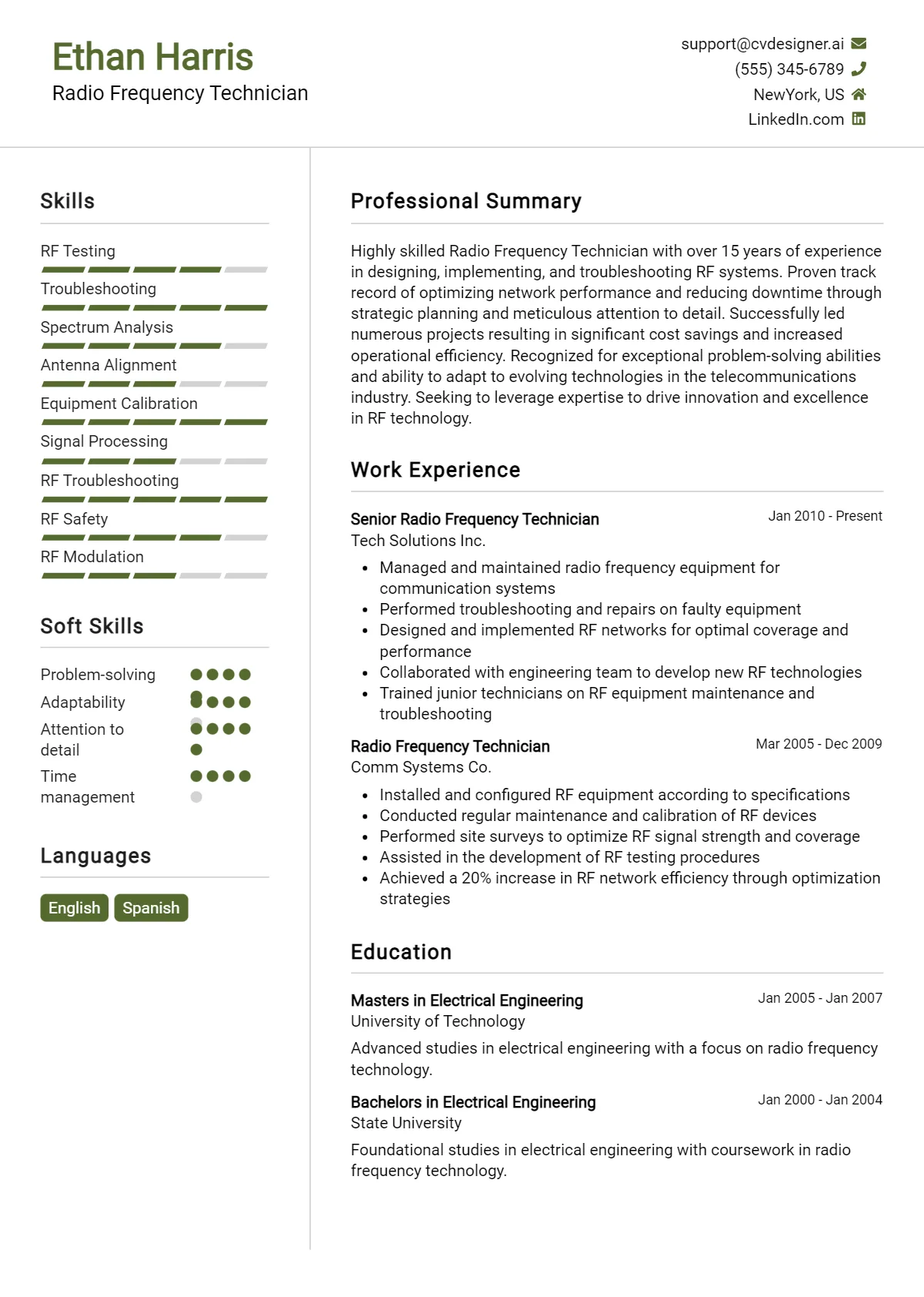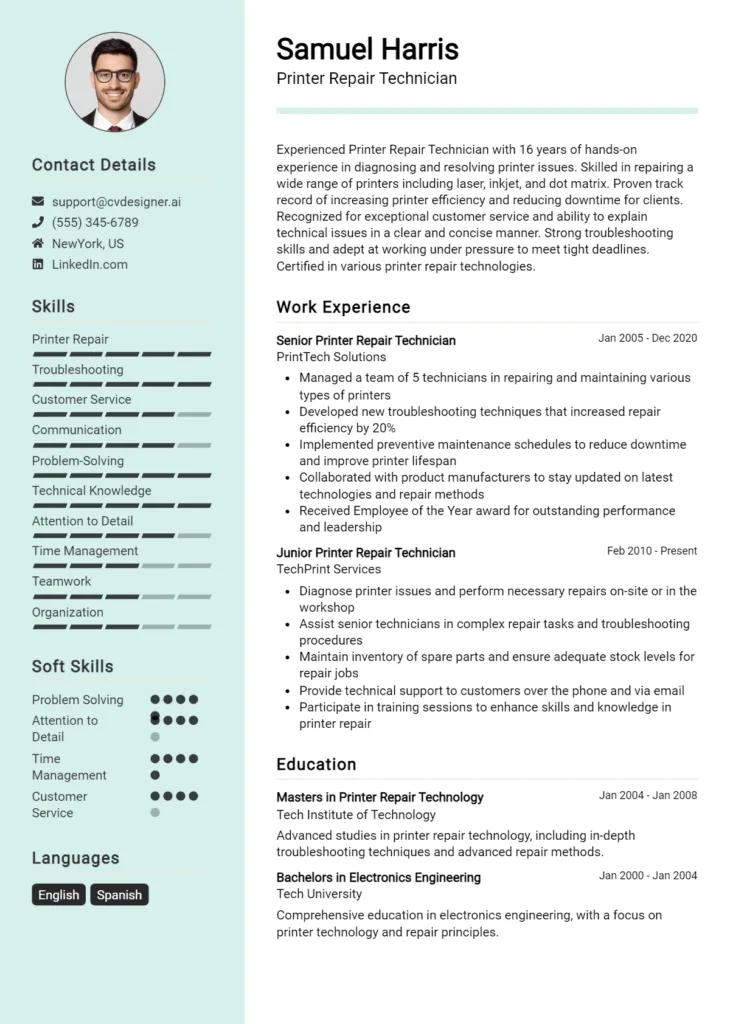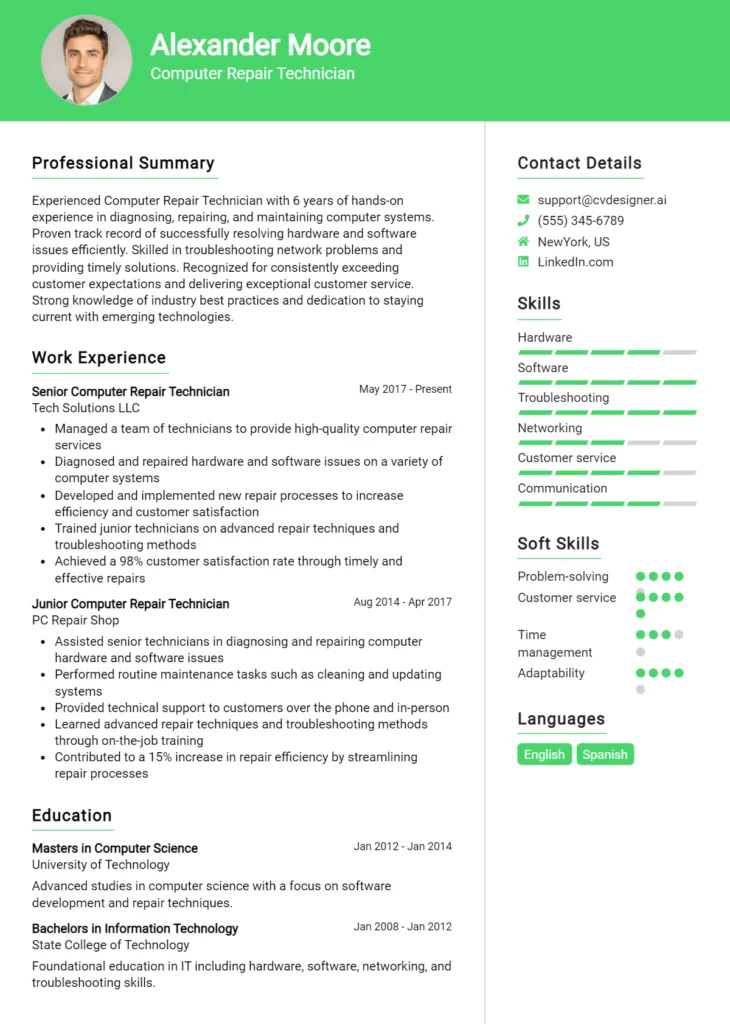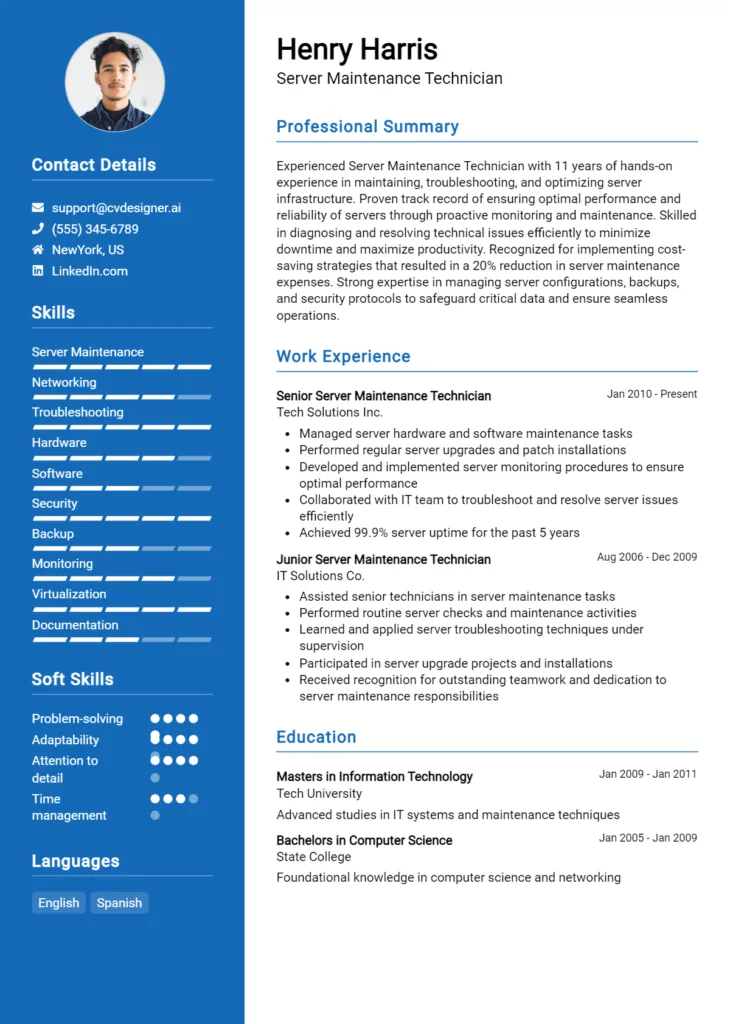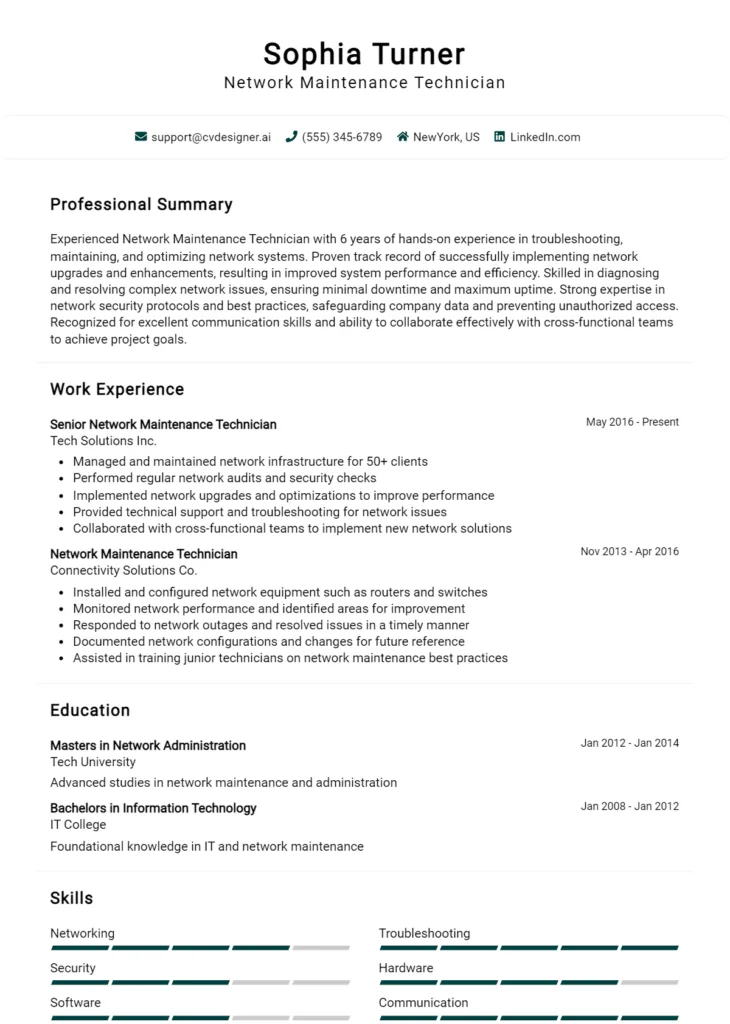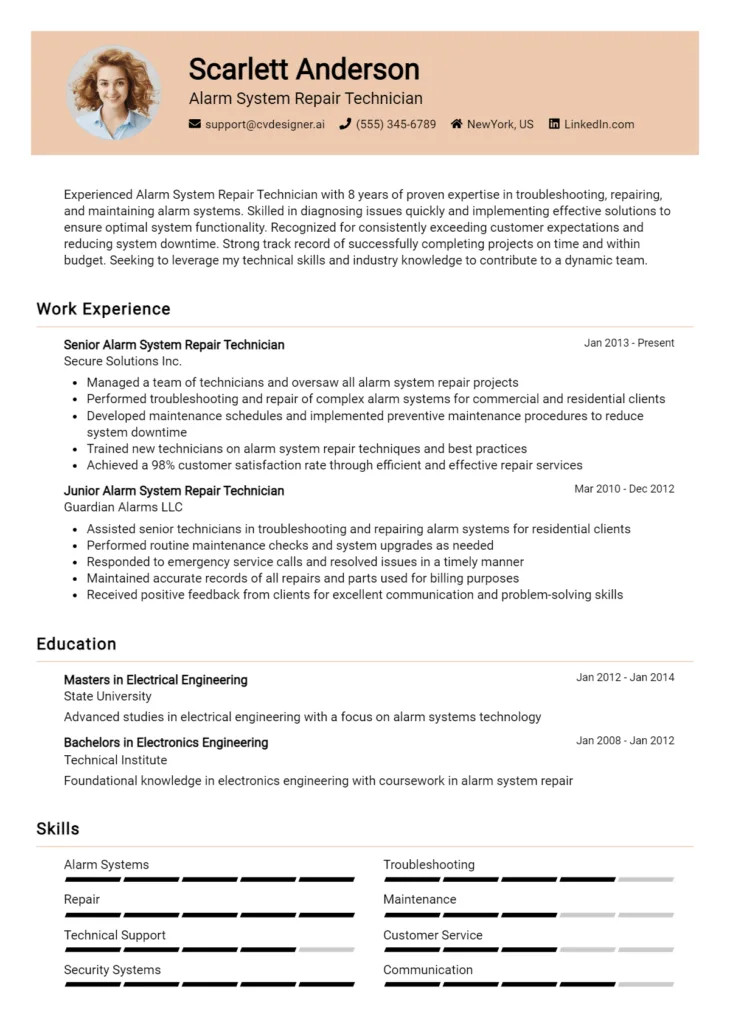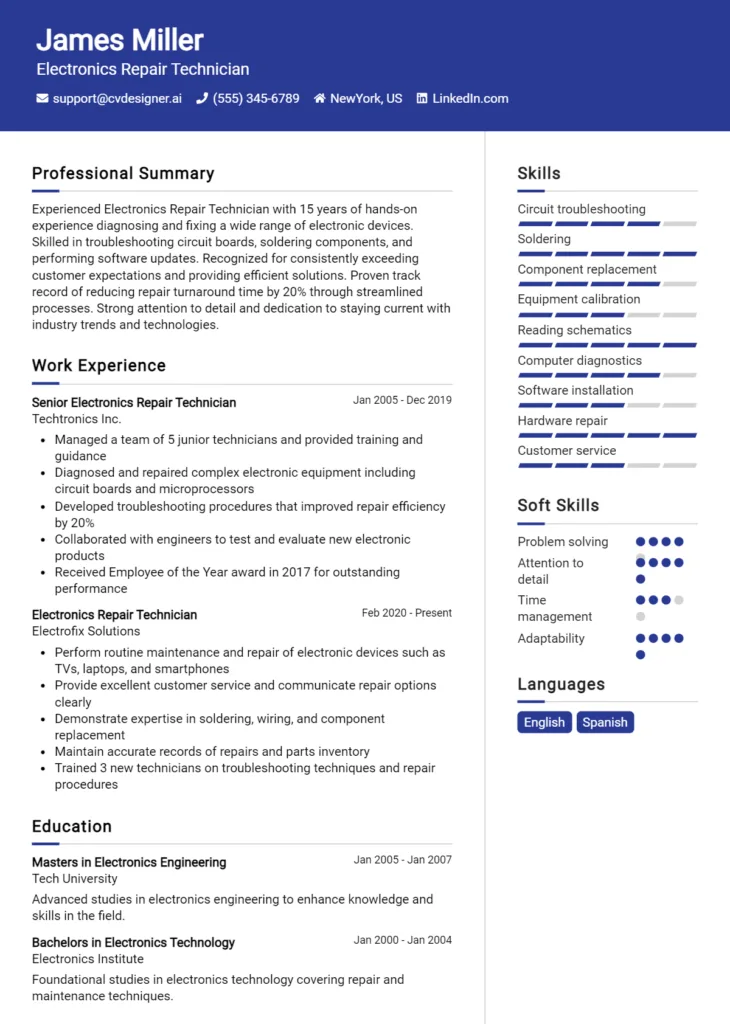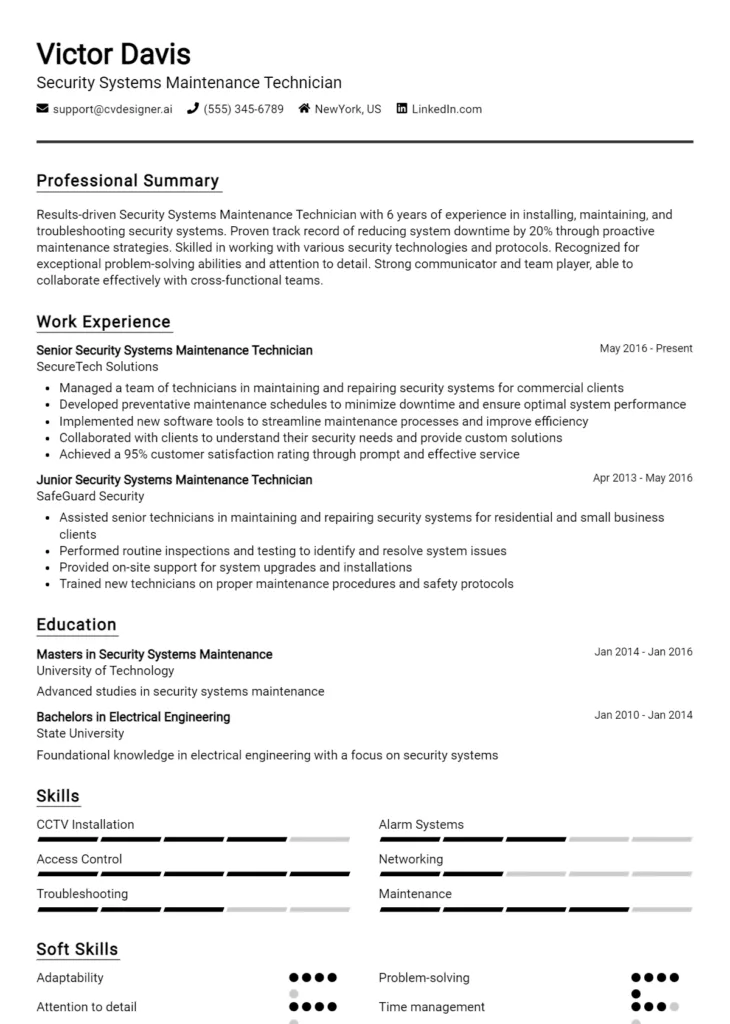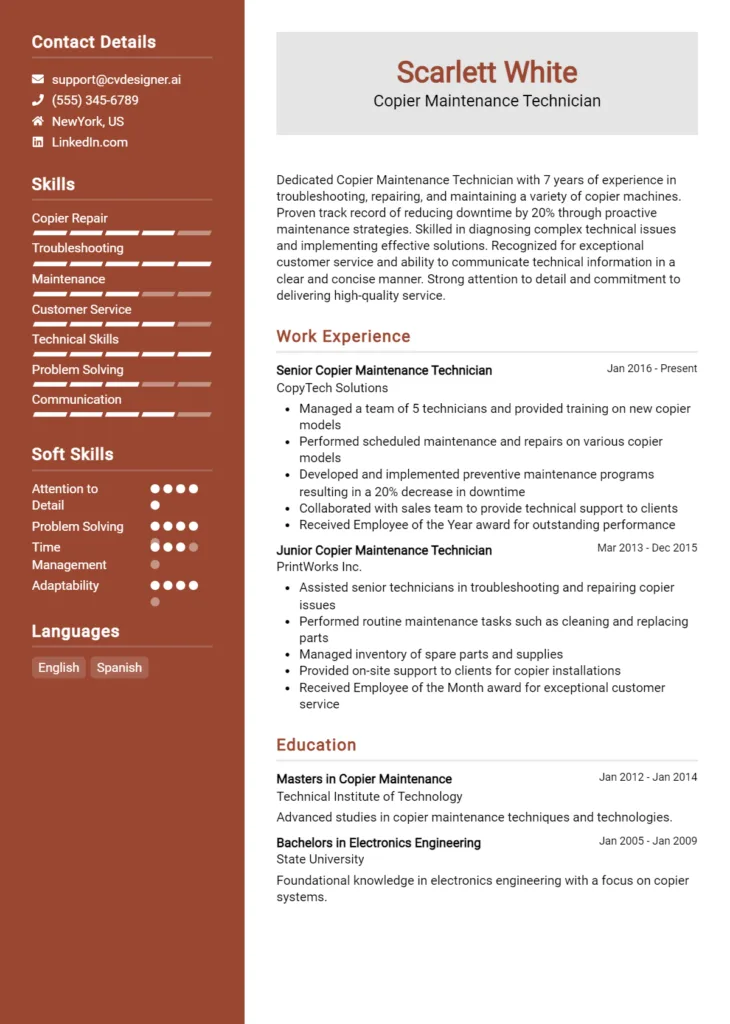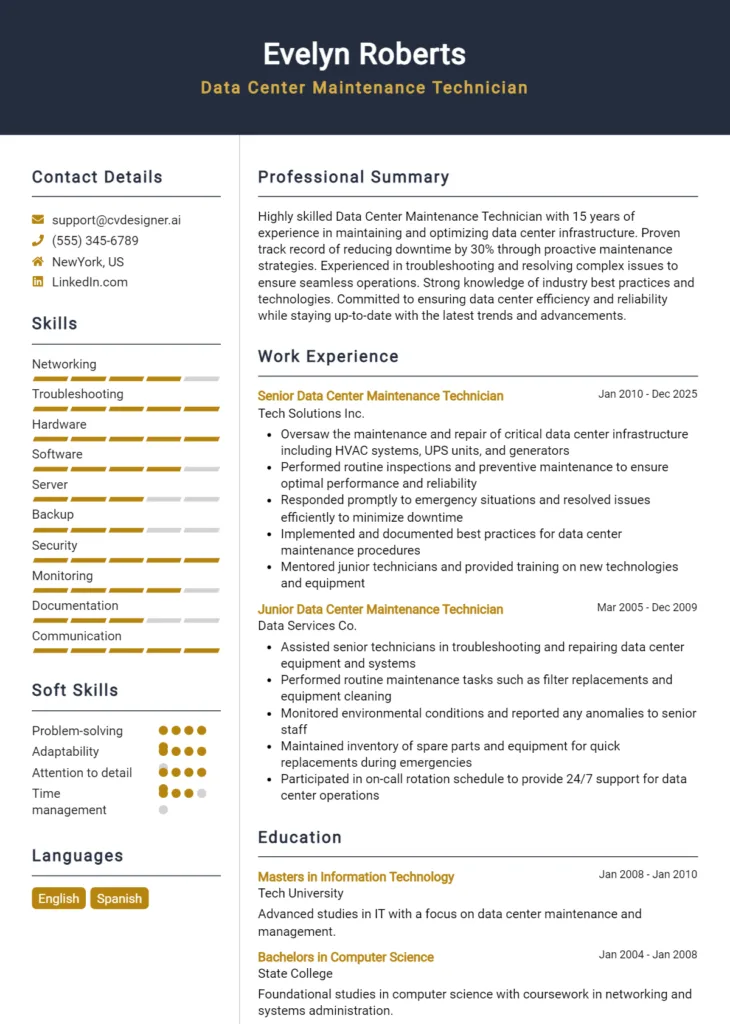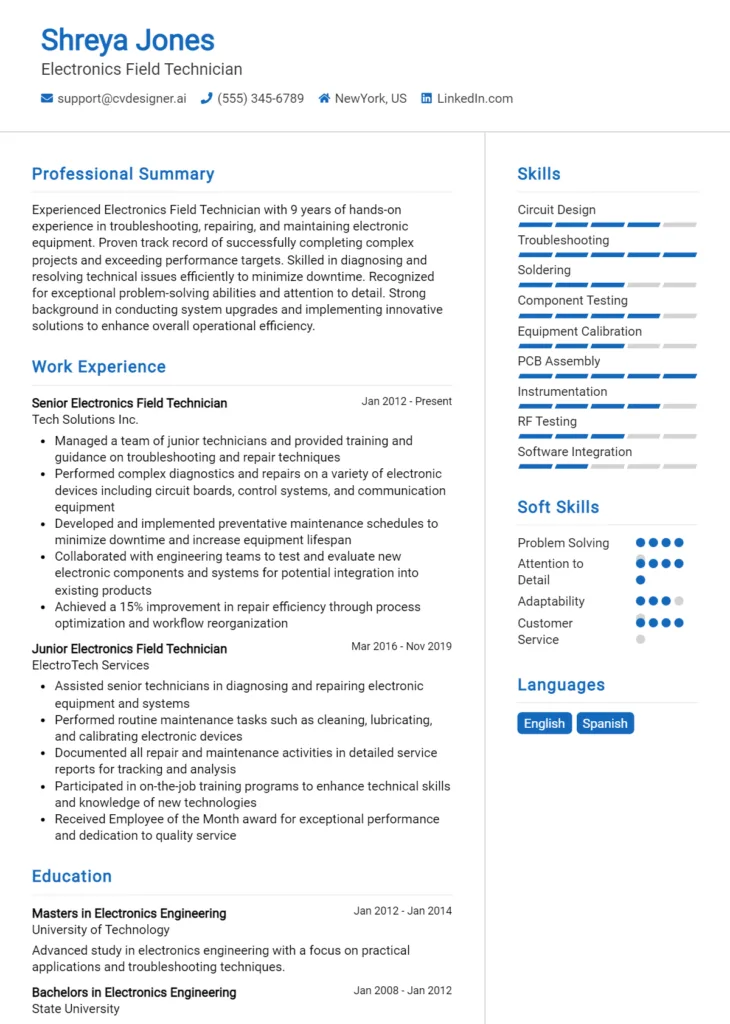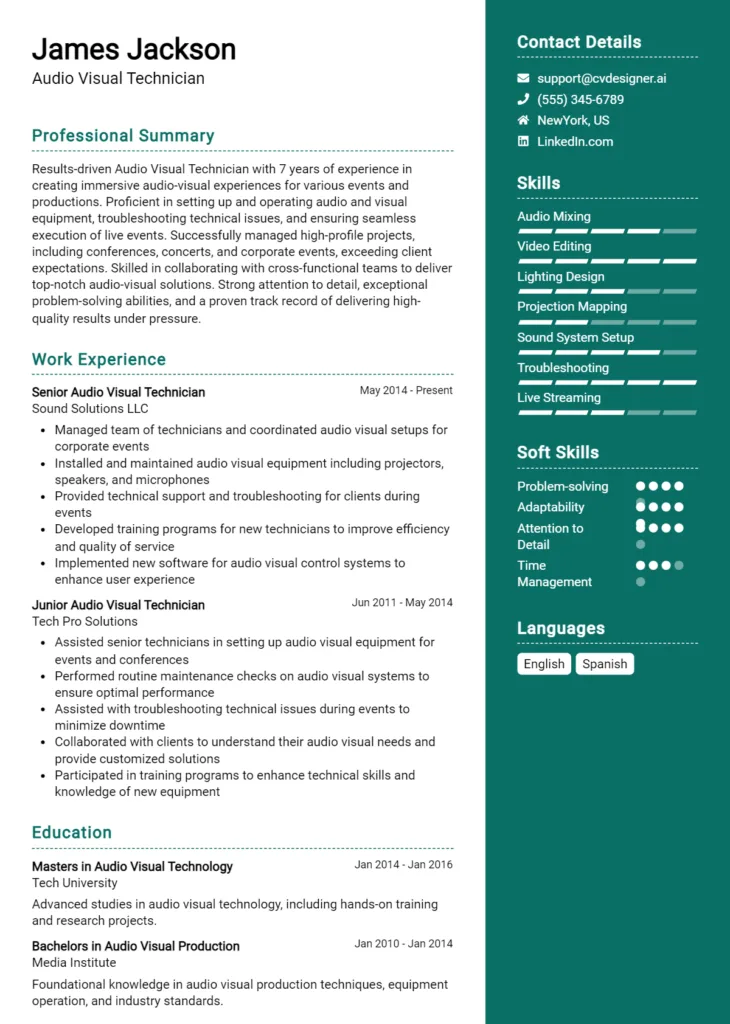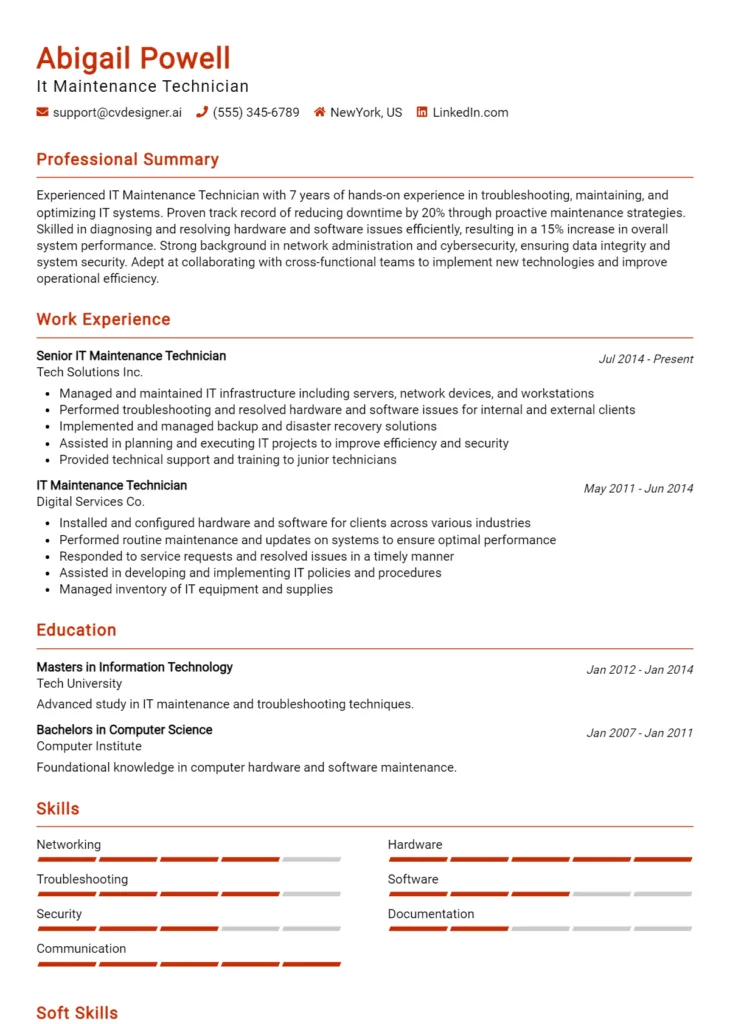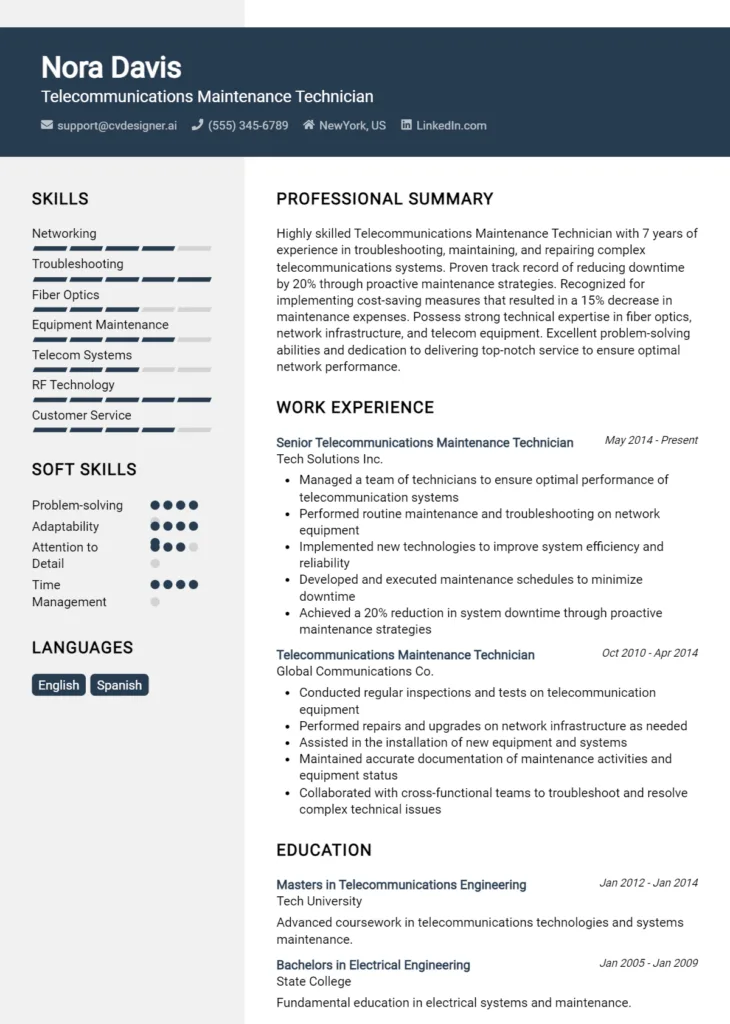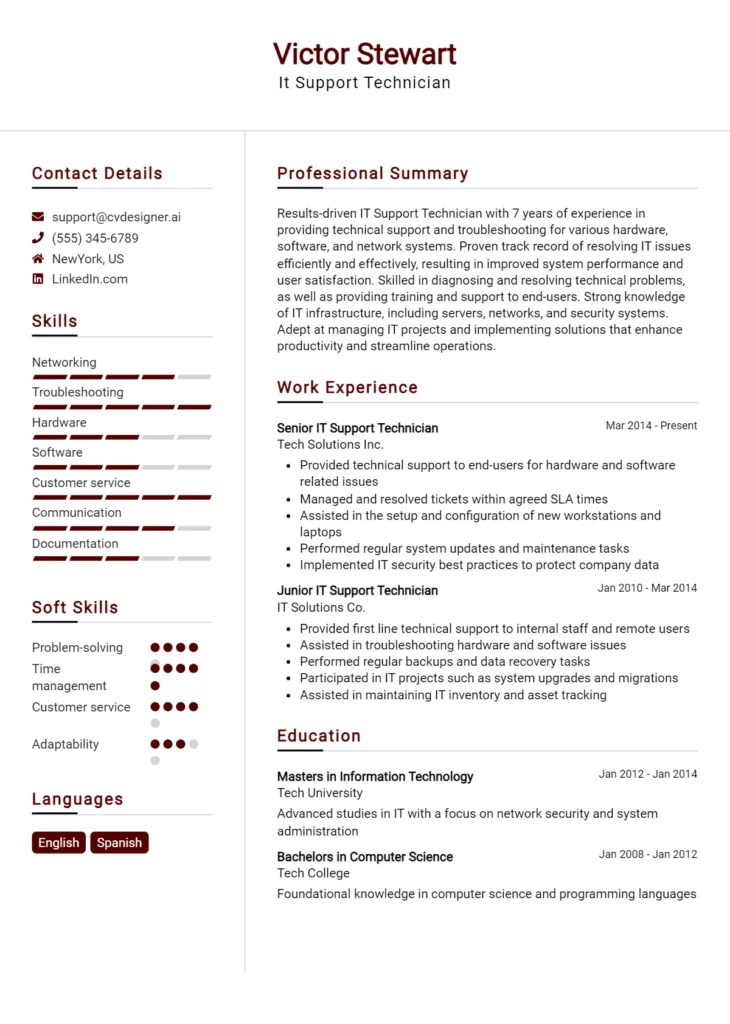Radio Frequency Technician Core Responsibilities
A Radio Frequency Technician plays a pivotal role in ensuring the seamless operation of communication systems. Core responsibilities include troubleshooting RF equipment, conducting signal analysis, and maintaining transmission systems, which require strong technical, operational, and problem-solving skills. This role often bridges engineering, operations, and customer service departments, facilitating effective collaboration. A well-structured resume that highlights these competencies is vital, as it demonstrates how the technician contributes to the organization's overall goals and operational efficiency.
Common Responsibilities Listed on Radio Frequency Technician Resume
- Install, maintain, and repair RF communication equipment.
- Conduct regular inspections and performance tests on RF systems.
- Analyze signal quality and troubleshoot interference issues.
- Collaborate with engineering teams to optimize system performance.
- Document technical procedures and maintenance activities.
- Assist in the design and implementation of RF systems.
- Provide technical support and training to users and staff.
- Ensure compliance with safety regulations and industry standards.
- Monitor equipment and system performance to identify potential upgrades.
- Work with project managers to meet deadlines and project specifications.
- Utilize specialized software for RF analysis and diagnostics.
- Maintain inventory of RF components and tools.
High-Level Resume Tips for Radio Frequency Technician Professionals
In today’s competitive job market, a well-crafted resume is crucial for Radio Frequency Technician professionals looking to stand out. Your resume is often the first impression you make on potential employers, and it serves as a vital marketing tool that reflects your skills, qualifications, and achievements. A strong resume not only showcases your technical expertise but also demonstrates how you can add value to the organization. This guide will provide practical and actionable resume tips specifically tailored for Radio Frequency Technician professionals, helping you to create a compelling document that captures attention and opens doors to new opportunities.
Top Resume Tips for Radio Frequency Technician Professionals
- Tailor your resume to the specific job description; use keywords from the posting to align your qualifications with what the employer seeks.
- Highlight relevant experience by focusing on past positions where you utilized RF technology, including specific duties and accomplishments.
- Quantify your achievements; for example, specify how you improved signal strength by a certain percentage or reduced downtime.
- Showcase industry-specific skills such as knowledge of RF testing equipment, spectrum analyzers, and troubleshooting techniques.
- Include certifications and training that are relevant to the field, such as FCC licenses or specialized RF courses.
- Emphasize problem-solving abilities by detailing instances where you successfully addressed technical challenges.
- Utilize a clear and professional format that enhances readability, making it easy for hiring managers to find key information quickly.
- Incorporate soft skills like teamwork, communication, and attention to detail, as these are vital in collaborative work environments.
- Keep your resume concise and focused; aim for one page unless you have extensive relevant experience.
By implementing these tips, you can significantly enhance your resume's effectiveness, increasing your chances of landing a job in the Radio Frequency Technician field. A well-structured and targeted resume will help you make a strong impression, showcasing your qualifications and readiness to contribute to potential employers.
Why Resume Headlines & Titles are Important for Radio Frequency Technician
In the competitive field of Radio Frequency Technology, a well-crafted resume headline or title plays a pivotal role in capturing the attention of hiring managers. A strong headline provides a concise summary of a candidate's key qualifications and can serve as a hook that draws employers in to read further. It should convey relevance to the specific job being applied for, encapsulating the candidate's expertise and value in one impactful phrase. By presenting a clear and engaging headline, applicants can significantly enhance their chances of making a memorable first impression.
Best Practices for Crafting Resume Headlines for Radio Frequency Technician
- Keep it concise—aim for one impactful phrase.
- Use industry-specific terminology relevant to Radio Frequency Technology.
- Highlight your most significant skills or certifications.
- Tailor your headline to match the job description.
- Incorporate measurable accomplishments when possible.
- Avoid generic terms; be specific about your expertise.
- Use action-oriented language to convey confidence and capability.
- Consider including years of experience to enhance credibility.
Example Resume Headlines for Radio Frequency Technician
Strong Resume Headlines
Expert Radio Frequency Technician with 5+ Years in Wireless Communications
Certified RF Engineer Specializing in Signal Processing and Optimization
Results-Driven RF Technician with Proven Track Record in Network Troubleshooting
Weak Resume Headlines
Technician Looking for Job
Experienced Worker in Radio Frequencies
The strong headlines are effective because they are specific, demonstrate relevant expertise, and highlight the candidate's unique strengths. They immediately convey a sense of professionalism, focus, and value that can resonate with hiring managers. In contrast, the weak headlines fail to impress as they are vague and generic, lacking the detail necessary to capture the attention of employers. Such headlines do not differentiate the candidate or provide insight into their qualifications, making it less likely for them to stand out in a competitive job market.
Writing an Exceptional Radio Frequency Technician Resume Summary
A well-crafted resume summary is crucial for a Radio Frequency Technician, as it serves as the first impression to hiring managers. In a competitive job market, a strong summary quickly captures attention by highlighting key skills, relevant experience, and notable accomplishments that align with the job requirements. This brief yet impactful section should be concise and tailored specifically to the position, ensuring that the candidate stands out as a qualified professional ready to contribute to the organization.
Best Practices for Writing a Radio Frequency Technician Resume Summary
- Quantify Achievements: Use numbers and specific metrics to showcase your accomplishments, such as percentage improvements or cost savings.
- Focus on Skills: Highlight relevant technical skills, such as knowledge of RF theory, troubleshooting techniques, and equipment handling.
- Tailor the Summary: Customize the summary for each job application by aligning it with the job description and required qualifications.
- Be Concise: Keep the summary brief, ideally within 2-4 sentences, while still conveying essential information.
- Use Action Verbs: Start sentences with strong action verbs to convey a sense of proactivity and competence.
- Showcase Relevant Experience: Emphasize work history that directly relates to the RF field, including specific projects or roles.
- Incorporate Industry Keywords: Use keywords from the job posting to pass through applicant tracking systems (ATS) and catch the hiring manager’s eye.
- Maintain Professional Tone: Ensure that the language used is professional and reflects your expertise in the field.
Example Radio Frequency Technician Resume Summaries
Strong Resume Summaries
Detail-oriented Radio Frequency Technician with over 5 years of experience in troubleshooting and optimizing RF systems. Successfully reduced signal loss by 30% through innovative testing methodologies and equipment upgrades.
Results-driven RF Technician skilled in spectrum analysis and modulation techniques, with a proven track record of enhancing system performance by 25%. Adept in collaborating with engineering teams to implement solutions that meet stringent regulatory requirements.
Certified Radio Frequency Technician with extensive experience in field testing and equipment calibration. Increased operational efficiency by 40% by streamlining testing procedures and ensuring compliance with industry standards.
Weak Resume Summaries
Experienced technician looking for a job in RF systems. I have some skills in troubleshooting and testing.
Radio Frequency Technician with a background in various technical jobs. I am hardworking and eager to learn more.
The strong resume summaries are effective because they present quantifiable achievements, specific skills relevant to the role, and demonstrate a clear alignment with the job requirements. In contrast, the weak summaries are vague, fail to provide measurable outcomes, and lack the specificity that hiring managers seek, making them less compelling in a competitive job market.
Work Experience Section for Radio Frequency Technician Resume
The work experience section of a Radio Frequency Technician resume is crucial as it serves as a platform to showcase the candidate's technical skills, project management abilities, and capacity to deliver high-quality results. This section allows potential employers to gauge how well the candidate's past experiences align with the industry's standards and expectations. By quantifying achievements—such as improvements in signal strength or reductions in downtime—and clearly articulating technical competencies, candidates can effectively demonstrate their value in a competitive job market.
Best Practices for Radio Frequency Technician Work Experience
- Clearly define technical skills relevant to radio frequency technologies, such as RF design, troubleshooting, and testing methodologies.
- Quantify achievements with metrics, such as percentage improvements in signal quality or cost reductions achieved through optimized processes.
- Highlight collaborative efforts with teams to showcase interpersonal skills and the ability to work well in group settings.
- Use action verbs to describe responsibilities and accomplishments, making statements more dynamic and impactful.
- Tailor the work experience section to match the specific job description, emphasizing relevant experiences that align with the role.
- Include specific technologies, software, or tools used, demonstrating familiarity with industry standards and innovations.
- Showcase leadership roles or initiatives taken during projects, reinforcing the ability to manage teams effectively.
- Maintain clarity and conciseness to ensure that key points are easily understood without overwhelming the reader.
Example Work Experiences for Radio Frequency Technician
Strong Experiences
- Led a team of 5 technicians in the redesign of a communication system, resulting in a 30% increase in signal coverage across a 50-mile radius.
- Implemented a new testing protocol that reduced equipment downtime by 25%, improving overall operational efficiency and saving the company $50,000 annually.
- Collaborated with cross-functional teams to develop a next-generation RF amplifier, which surpassed industry performance benchmarks by 15%.
- Trained and mentored junior technicians, enhancing team skills and contributing to a 40% decrease in training time for new hires.
Weak Experiences
- Worked on various RF projects without specific details on contributions or outcomes.
- Assisted in troubleshooting tasks but did not provide examples of successful problem resolution.
- Participated in team meetings and discussions with no clear impact on project outcomes.
- Involved in general maintenance of equipment without quantifying improvements or efficiencies gained.
The examples listed as strong experiences effectively illustrate clear, quantifiable outcomes and significant contributions to team efforts, showcasing the candidate's technical leadership and collaborative skills. In contrast, the weak experiences lack specificity and measurable impacts, making them less compelling and failing to demonstrate the candidate's true abilities and achievements in the field of radio frequency technology.
Education and Certifications Section for Radio Frequency Technician Resume
The education and certifications section of a Radio Frequency Technician resume plays a critical role in showcasing a candidate's academic background and professional qualifications. This section serves as a vital indicator of the candidate's knowledge and skills, particularly in a field where technological advancements occur rapidly. By highlighting relevant degrees, industry-recognized certifications, and continuous learning efforts, candidates can effectively demonstrate their commitment to professional development. Including pertinent coursework and specialized training not only enhances credibility but also aligns the candidate's qualifications with the specific requirements of the job role, making them a more attractive candidate to potential employers.
Best Practices for Radio Frequency Technician Education and Certifications
- List only relevant degrees and certifications that pertain directly to radio frequency technology.
- Provide specific details such as the name of the institution, degree earned, and graduation date.
- Highlight any industry-recognized certifications such as Certified Radio Frequency Technician (CRFT) or equivalent.
- Include relevant coursework or specialized training that showcases expertise in RF principles, circuit design, and telecommunications.
- Use a chronological format to display the most recent education and certifications first.
- Consider adding professional development courses or workshops that demonstrate ongoing learning.
- Be mindful of the level of detail; avoid overwhelming the reader with excessive information.
- Tailor the section to the specific job description by including keywords relevant to the role.
Example Education and Certifications for Radio Frequency Technician
Strong Examples
- Bachelor of Science in Electrical Engineering, University of Technology, Graduated May 2020
- Certified Radio Frequency Technician (CRFT), National Association of Broadcasters, Issued July 2021
- Advanced RF Circuit Design, Online Course, Coursera, Completed March 2022
- Associate Degree in Electronics Technology, Community College of Applied Sciences, Graduated December 2018
Weak Examples
- Bachelor of Arts in History, University of Arts, Graduated May 2019
- Certification in Basic Computer Skills, Online Course, Completed February 2020
- High School Diploma, Generic High School, Graduated June 2015
- Outdated RF Technician Certification, Issued January 2015
The strong examples are considered effective because they directly relate to the field of radio frequency technology, showcasing relevant degrees and certifications that enhance the candidate's qualifications. These examples demonstrate a solid educational foundation and commitment to professional development through industry-recognized credentials. In contrast, the weak examples lack relevance to the role, featuring degrees and certifications that do not align with the responsibilities of a Radio Frequency Technician, ultimately diminishing the candidate's credibility and appeal to potential employers.
Top Skills & Keywords for Radio Frequency Technician Resume
As a Radio Frequency Technician, having the right skills is essential for success in the field. Your resume should effectively highlight both hard and soft skills to demonstrate your technical expertise and interpersonal abilities. Employers seek candidates who not only possess the technical know-how to operate and maintain radio frequency equipment but also have the soft skills necessary to communicate effectively and work collaboratively in a team environment. By incorporating relevant skills into your resume, you can significantly enhance your chances of making a strong impression on potential employers.
Top Hard & Soft Skills for Radio Frequency Technician
Soft Skills
- Attention to Detail
- Problem-Solving
- Communication Skills
- Team Collaboration
- Time Management
- Adaptability
- Critical Thinking
- Customer Service Orientation
- Initiative
- Safety Awareness
Hard Skills
- RF Theory and Principles
- Equipment Calibration
- Signal Analysis
- Troubleshooting Techniques
- Knowledge of RF Test Equipment
- Antenna Design and Testing
- Spectrum Analysis
- Understanding of Communication Protocols
- Installation of RF Systems
- Data Analysis and Reporting
- Familiarity with Regulatory Standards
- Software Proficiency (e.g., MATLAB, LabVIEW)
- Schematic Reading
- Networking Basics
- RF Circuit Design
Stand Out with a Winning Radio Frequency Technician Cover Letter
Dear Hiring Manager,
I am writing to express my interest in the Radio Frequency Technician position at [Company Name], as advertised on [Job Board/Company Website]. With a solid background in telecommunications and extensive experience in RF circuit design and testing, I am confident in my ability to contribute effectively to your team. My technical skills, combined with my passion for emerging technologies, make me a perfect fit for this role.
Throughout my career, I have gained hands-on experience in troubleshooting and maintaining RF systems, including antennas, transmitters, and receivers. At [Previous Company], I was responsible for conducting RF signal analysis and implementing design modifications that improved signal clarity by 30%. My proficiency in using RF measurement tools and software has enabled me to diagnose issues quickly and implement efficient solutions. I am also well-versed in compliance with industry standards and regulations, ensuring that all projects meet safety and quality requirements.
In addition to my technical expertise, I possess strong communication and collaboration skills. I have successfully worked in team settings, collaborating with engineers and project managers to deliver projects on time and within budget. I am adept at training and mentoring junior technicians, which fosters a productive work environment and enhances team performance. I am excited about the opportunity to bring my unique skills to [Company Name] and contribute to innovative RF solutions that drive success.
Thank you for considering my application. I look forward to the possibility of discussing how my skills and experiences align with the needs of your team. I am enthusiastic about the chance to contribute to [Company Name] and help advance its mission in the telecommunications industry.
Sincerely,
[Your Name]
[Your Contact Information]
Common Mistakes to Avoid in a Radio Frequency Technician Resume
When applying for a position as a Radio Frequency Technician, a well-crafted resume is essential to make a strong impression on potential employers. However, many candidates make common mistakes that can detract from their qualifications and experience. Avoiding these pitfalls can significantly enhance the effectiveness of your resume and improve your chances of landing an interview. Here are some common mistakes to steer clear of:
Generic Objective Statement: Using a vague or generic objective that doesn't specify your career goals or how you can contribute to the company can make your resume blend in rather than stand out.
Ignoring Relevant Skills: Failing to highlight specific technical skills related to radio frequency systems, such as knowledge of RF theory or experience with spectrum analyzers, can leave hiring managers questioning your qualifications.
Lengthy Descriptions: Providing overly detailed job descriptions can be overwhelming. Focus on concise bullet points that emphasize your most relevant experiences and achievements.
Lack of Quantifiable Achievements: Not including metrics or quantifiable results from your previous roles can weaken your impact. Use numbers to demonstrate your contributions, such as reducing signal interference by a specific percentage.
Poor Formatting: A cluttered or inconsistent format can make it difficult for hiring managers to read your resume. Ensure that your layout is clean, with clear headings and uniform font styles.
Spelling and Grammar Errors: Typos and grammatical mistakes can create an unprofessional impression. Always proofread your resume thoroughly or consider having someone else review it for errors.
Failure to Tailor the Resume: Sending out a one-size-fits-all resume without customizing it for the specific job can lead to missed opportunities. Tailor your resume to highlight the experience and skills that align most closely with the job description.
Neglecting Certifications and Training: Overlooking relevant certifications or training can be a significant oversight. Ensure that any licenses or specialized training pertinent to radio frequency technology are prominently displayed.
Conclusion
As we have explored the essential responsibilities and skills required for a Radio Frequency Technician, it's clear that this role demands a blend of technical expertise, analytical thinking, and practical problem-solving abilities. From understanding RF principles to troubleshooting complex systems, a successful technician must be well-versed in both theory and application.
Moreover, staying updated with the latest industry advancements and tools is crucial for maintaining a competitive edge in this rapidly evolving field. Networking with other professionals and pursuing continuous education can further enhance your skill set and career prospects.
To ensure you stand out in the job market, taking a close look at your resume is imperative. Make sure it showcases not only your technical skills but also your relevant experience and accomplishments.
To assist you in this endeavor, consider utilizing the following resources:
- Resume templates to give your application a professional touch.
- A resume builder that simplifies the creation process and helps highlight your qualifications effectively.
- Resume examples for inspiration and guidance on formatting and content.
- Cover letter templates to complement your resume and make a strong first impression.
Take the time to review and refine your Radio Frequency Technician resume today, and set yourself up for success in your career!

